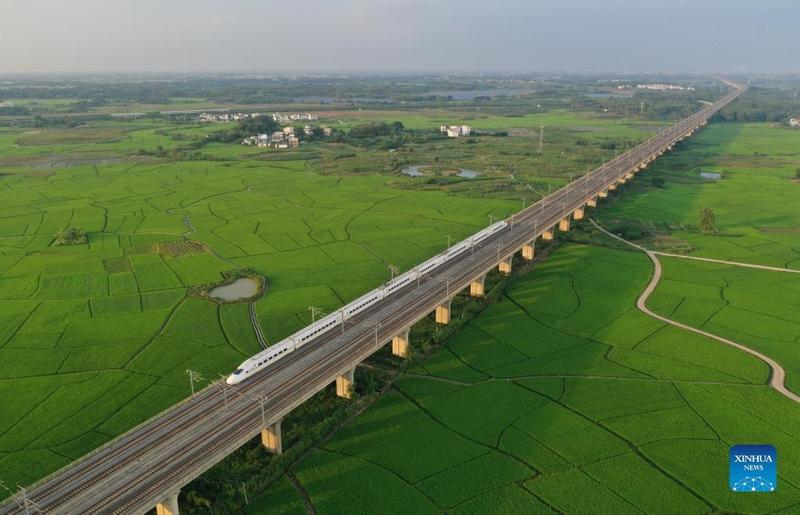 This aerial photo taken on Sept 19, 2021 shows a bullet train running above paddy fields in Gula township, Binyang county, south China's Guangxi Zhuang autonomous region. (PHOTO / XINHUA)
This aerial photo taken on Sept 19, 2021 shows a bullet train running above paddy fields in Gula township, Binyang county, south China's Guangxi Zhuang autonomous region. (PHOTO / XINHUA)
The State Council executive meeting chaired by Premier Li Keqiang on Wednesday adopted the 14th Five-Year Plan for New Infrastructure Development, to spur domestic demand, economic transformation and growth sustainability.
In the 14th Five-Year Plan period (2021-25), a well-calibrated layout will be in place for the development of new infrastructure, underpinned by information networks and technological innovation. This is conducive to sustaining growth, facilitating structural adjustments and benefiting the people.
Advancing new infrastructure development will help mobilize effective investment, sustain growth, readjust the structure and enhance people's well-being.
Li Keqiang,
Chinese premier
"We should better harness the key role of effective investment," Li said. "Advancing new infrastructure development will help mobilize effective investment, sustain growth, readjust the structure and enhance people's well-being."
Information infrastructure development will be accelerated. National backbone networks and metropolitan area networks will be fortified in a coordinated way with higher bandwidth. Gigabit fiber optic networks will be remodeled to deliver faster connections.
ALSO READ: Investing in new infrastructure
The commercial use of new-generation mobile communication networks of scale will be advanced. Space-based information infrastructure will be improved for satellite communications, navigation, remote sensing and other purposes. A ubiquitous and collaborative internet of things will be developed.
Integrated infrastructure will be steadily developed. A multitiered industrial internet platform will be fostered to promote collaborative innovation. In line with advancing the new urbanization, smart infrastructure will be built in transportation, logistics, energy and urban utilities. Agriculture will be made more digitized. Infrastructure related to people's lives such as telemedicine and online education will be advanced.
"The planning and construction of new infrastructure should move forward along with technological advances and innovation. We may plan ahead wherever possible, yet also take a fact-based approach and take things forward step by step," Li said.
In-depth integration among universities, research institutes and high-tech enterprises will be facilitated to strengthen high-level, interdisciplinary and frontier research. The research and development of industrial generic technology will be supported. Open and specialized maker spaces and virtual innovation communities will be developed, to spur entrepreneurial activity and innovation.
READ MORE: Premier Li says more support needed for innovation
"Government investment, such as central budgetary investment and local government special-purpose bonds, should be better utilized, to mobilize investment from the private sector, and advance the development of new infrastructure in a well-calibrated and well-paced way," Li said.
Investment from diverse channels will be encouraged, and openness and cooperation advanced. The private sector and overseas investors will be supported in participating in the investment and operation of new infrastructure.










